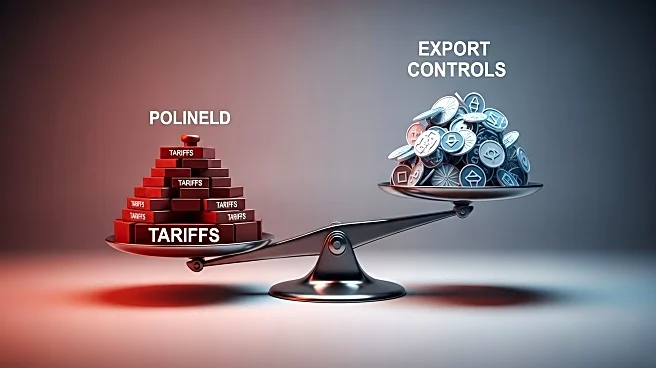What is the story about?
What's Happening?
The United States Trade Representative, Jamison Greer, announced that the U.S. attempted to initiate a phone call with China following its decision to expand rare earths export controls. However, China deferred the call, accusing the U.S. of double standards. In response to China's actions, President Trump imposed 100% tariffs on Chinese exports to the U.S. and introduced new export controls on critical software, effective November 1. President Trump expressed a desire to assist China, not harm it, despite the ongoing trade tensions. The Chinese embassy in Washington, D.C., has not commented on the situation. China criticized the U.S. tariffs, labeling them as double standards, and defended its export restrictions due to military concerns.
Why It's Important?
The escalation in trade tensions between the U.S. and China has significant implications for global markets and international relations. The imposition of tariffs and export controls by the U.S. could lead to increased costs for American businesses relying on Chinese imports, potentially affecting consumer prices and supply chains. China's restrictions on rare earth exports, crucial for various industries, could impact global technology and defense sectors. The ongoing trade war may further strain diplomatic relations between the two nations, influencing geopolitical dynamics and economic stability worldwide.
What's Next?
The situation remains fluid, with potential developments hinging on diplomatic engagements between the U.S. and China. A meeting between President Trump and Chinese President Xi Jinping at the Asia-Pacific Economic Cooperation forum in South Korea later this month could provide an opportunity for dialogue and de-escalation. Markets are expected to stabilize as clarity emerges from these discussions. Stakeholders, including businesses and policymakers, will closely monitor the outcomes of any negotiations or agreements reached during this period.
Beyond the Headlines
The trade conflict highlights broader issues of economic nationalism and protectionism, with both countries leveraging tariffs and export controls as tools of political influence. The focus on rare earth elements underscores the strategic importance of these resources in modern technology and defense applications. The situation may prompt other nations to reassess their trade policies and alliances, potentially leading to shifts in global economic power structures.















